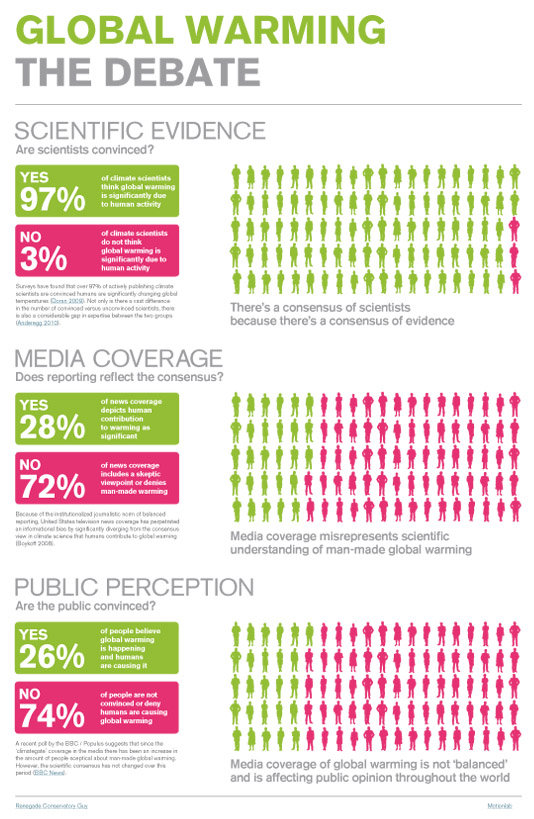For years there has been a misconception about climate change, what is happening to our world and who or what is causing this change. The majority of this skepticism and denial can be left in the hands of the media and the people who are in control of the media “who have a political axe to grind” (Hansen 2010 cited in Shah 2013). For years propaganda has been shoved in the faces of the public by big businesses (mostly energy companies) and countries (United States and the rise of carbon emissions) that want to conceal this misfortune because it could affect their economic future. Unfortunately for them, climate change is beginning to be accepted as a reality due to climate-scientists and man-made global warming (Shah 2013).
Big businesses, governments and countries have been responsible for pressuring the media into “false balancing,” which could be one of the reasons why global warming is seen as “one of the biggest frauds of our era” (Shah 2013). This idea of ‘false balance’ is present when “reporters may for too long have been balancing opinions about science when in fact they might better have been evaluating and reporting evidence based on the science” (Ward 2009, pp. 208). Reporters are misleading the public by writing about how people feel towards the science that is found, rather than the factual science itself. Therefore, reporters are spending their time writing about how the public believes climate change is not realistic when science shows that measures need to be taken to help prevent this climate change and fast.
Stanford climate researcher and policy analyst, Steven Schneider, expresses his exasperation towards media coverage on the issue of climate change when he explains how “science is not politics. You can’t just get two opposing viewpoints and think you’ve done due diligence. You’ve got to cover the multiple views and the relative credibility of each view” (Bergeron 2009). In this statement he is explaining how the media is doing a poor job on covering all viewpoints for climate change. The main concern is to present news that will sell to the public, not the facts. Because of this, misconceptions have been made towards the seriousness of climate change and the public does not understand that change begins with ‘us’, humanity. Hopefully, the media will begin to see that the facts need to be presented to society, not just what is popular or what people are hoping to hear.
Reference List:
Bergeron, L 2009, Media often fail in their global warming coverage, says climate researcher, Stanford News, accessed on 10 October 2014 <http://news.stanford.edu/news/2009/february18/aaas-schneider-climate-change-media-021809.html>
Shah, A 2013, Global Warming, Spin and Media, Global Issues, accessed on 8 October 2014 <http://www.globalissues.org/article/710/global-warming-spin-and-media>
Ward, B 2009, ‘Journalism ethics and climate change reporting in a period of intense media uncertainty’, Ethics in Science and Environmental Politics, vol. 9:13-15, pp. 207-209.
